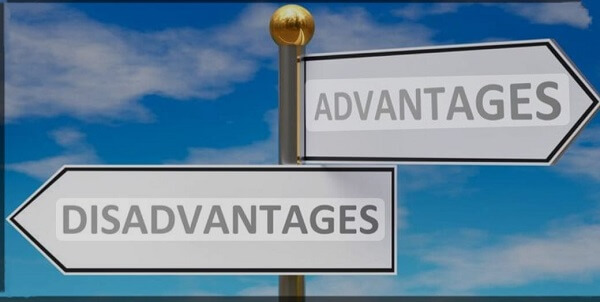Advantages and Disadvantages of BusinessMost of us have, at some point, thought about establishing and operating a business. We love the idea of working for ourselves, making significantly more money than if we worked for someone else on a salary. All of these sound like great reasons to start a business. A starting entrepreneur will require a lot of eagerness, the capacity to make unconventional judgments, and the willingness to accept responsibility because starting a firm is usually fraught with danger. However, there may be substantial benefits to working hard. Every Business needs constant attention and development to survive in the competitive market. Around the world, there are more than 400,000,000 business owners, one for every 18 people. 
Apart from earning profit for oneself, business provides self-satisfaction and a sense of achievement of building an empire right from the bottom. The motivation to start a business can be finding the solution for some common problem that not many of us are addressing. In the path of Business, an individual has to face many extraordinary challenges, and if they do not cater to those difficulties, it proves to be a big trouble. Therefore, Business is a medium that satisfies you with its multidimensional attributes, but it comes with its relative pros and cons. 
Advantages of Business1) Benefits of Corporate Independence and Control Business owners control everything, including revenue, costs, and debt. They make all the important choices. All the decision-making powers vest with them. 2) Mode of Living and Freedom As a businessman, one may work according to one's schedule, and the time and place of work are own. If spending time with your family is vital, working from home and cutting out the commute can be the best option. One may fully express who they are via their Business. Owning the Business provides the lifestyle flexibility needed to balance family with a successful profession, especially for women. There are few work options for millennials who grew up with computers, and because they are more interested in lifestyle than money, many have resorted to entrepreneurship. However, with 80% of them reporting earnings, millennials are highly successful in this quest, which is 3% more than the national corporate average. 3) Huge Financial Advantages There is no cap to the amount of revenue and income your firm may generate, provided you have a strong tolerance for financial risk; moreover, having your own Business allows you to reap the rewards of your labor. You may use investor's funds rather than your own to obtain and leverage capital for the new company. 4) Individual Growth, Creative Freedom, and Personal Satisfaction Business people work in a profession that satisfies them as business owners. One may create something that might end up as a part of their lasting legacy and can make money by using their talents, hobbies, and passions. Finally, they get personal fulfillment from putting their ideas under implementation, working hard, and being lucky. 5) Tax Advantages Majorly business costs are normally deductible, which lowers a company's taxable income. Most tax regulations are designed to decrease the tax burden of business owners. Lower long-term capital gains taxes are applied to profits. Disadvantages of BusinessLet's examine a few drawbacks of choosing business as profession over others. 1) Financial Risks Financial risk is the natural component of Business. To establish or expand the firm, there would be the requirement for more funds, which can be through debt or personal wealth. If anything goes wrong and the Business suffers significant financial loss, there must be a backup plan to reequip the losses. Otherwise, it may result in the closure of the Business. Unfortunately, four out of every five enterprises fail during the first five years. 2) Issues with Stress and Health Businessmen "wear many hats" as business owners since they are the company's public face. There is an endless number of issues to handle, too many to name, including competitors, staff, invoices, equipment malfunctions, customer issues, supplier shortages, and late delivery. As the owner, they are also liable for the health of their workers and may even need to fire some of them. Finding quality candidates for the firm can be challenging even in a healthy economy with low unemployment. All these challenges impact the well-being of the individual both physically and mentally. 3) Commitment to Time People frequently launch enterprises to free up more time for family time. Although they are allowed to take time off, they may not be able to do so. In reality, they likely spend less time at leisure than they would if they were working for someone else. A forty-hour workweek is a misconception for many entrepreneurs and small company owners. They even have to work on the weekends, holidays, and odd hours. It might not be possible to have a typical "day off," at least initially. 4) Unknown Threats and Variables Even with the greatest intentions and thorough preparation before starting the firm, several unforeseeable variables may have a detrimental effect. A sudden geopolitical incident might cause the economy to contract quickly, leading to consumers cutting back on discretionary spending. A powerful rival can invade the market and steal customers. If a significant contributor or company partner becomes ill, the firm could find itself with new obligations. The unknowable aspects of Business can pose unprecedented challenges, but collaborating and making plans with the nearby Small Business Development Center can assist in lessening the likelihood of such occurrences. TakeawaysDespite the challenges and more than even likely chances of failure, the SBA estimates that about 250,000 new businesses are started each month in the US. You could experience great personal joy from knowing that small companies benefit society by generating employment in their neighborhood and acting responsibly as corporations. Some businesses and industry leaders got their start with a straightforward homegrown concept that revolutionized the industry. Consider companies like Facebook or Microsoft and innovators like Disney, Zuckerberg, Bezos, and Gates. Therefore, even if your company might not succeed to such heights, you can still be a tremendous force for change. And even though you might not be able to alter the world, your product or service may have a big influence on some people. It is wonderful that you can turn your desired hobby into a profession. For other people, entrepreneurship is their vocation. The life of your dreams is within your reach. ConclusionIt is crucial to understand that many obscure elements can determine the success or failure of a company. There are several hazards associated with company failure, inadequate revenue, and stress from added responsibilities. But starting a business also allows you to reap material and emotional benefits. An entrepreneur can effectively control and manage a business and has the freedom to carry out crucial managerial decisions. |
 For Videos Join Our Youtube Channel: Join Now
For Videos Join Our Youtube Channel: Join Now
Feedback
- Send your Feedback to [email protected]
Help Others, Please Share










